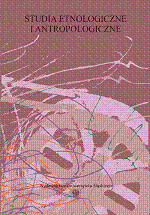Metodologické problémy výskumu mesta
Methodological Issues of Urban Ethnology
Author(s): Rastislava StoličnáSubject(s): Anthropology
Published by: Wydawnictwo Uniwersytetu Śląskiego
Summary/Abstract: In the past two decades, Slovak ethnologists have conducted studies of several urban communities revealing a complicated structure of social relations and yielding empirical data about the life of the city. They revealed that although the social dimension of the city life was based on universal differentiation principles — such as kinship, gender, age, race and ethnicity, religion, social class, occupation, and the like, it also changed in time and space. In the 20th century, especially politics and ideology was the decisive factors in social differentiation. Interests of political powers inspired antagonistic, bipolar orientations; they promoted differing ideas about the social order or regime and were the tool of polarization of society. Politics united people regardless of their social group membership. Groups were united by common feelings of belonging, togetherness, solidarity and shared beliefs. In the study of the city, most Slovak ethnologists methodologically prefer the combination of the micro and macro perspective — studying the individual and basing their interpretation on the large framework of broader social processes. They have primarily been interested in the question of how macro reality was reflected in people’s behavior and mainly how it influenced the formation of various groups, intergroup relations and relations with other groups and the broader social setting, norms of behavior, attitudes and opinions of these groups, and the like. As important appear those group characteristics that have been the source of stereotypical attitudes in the urban community — such as race, religion, political orientation, property, social status, family origin or territorial location. Especially ethnicity and religion are typical and lasting differentiation traits in Slovak cities. Therefore, ethnological study has focused on ethnic groups or religious minorities and their relations with the majority, as well as on the causes and contexts of conflicts. Therefore, research has focused on the issues of tolerance, isolation, integration, adaptation, and the like.
Journal: Studia Etnologiczne i Antropologiczne
- Issue Year: 2010
- Issue No: 10
- Page Range: 46-52
- Page Count: 7
- Language: Slovak

